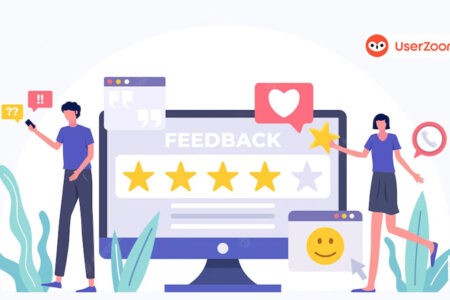First in Series of Benchmarking Reports for 2022 Finds Customer Frustration and Lack of Trust Lead to Missed Revenue, With Some Insurers Still Missing the Mark
Key Findings:
- Trust a key consideration in digital experience design
- Self Serve functionality is no longer optional, expected
- Modern functionality (best of breed consumer sites) drives consumer expectations
- Location considerations (despite online activity) still top of mind
UserZoom, the pioneer of the Digital User Experience (UX) Insights category, announced the findings of its 2022 Life Insurance Digital Experience Study, revealing that Mutual of Omaha ranks highest for digital user experience among prospective life insurance customers.
This mixed-methods study is based on responses from 500 prospective life insurance customers of Mutual of Omaha, Farmers Insurance, State Farm, Northwestern Mutual, and Prudential. The study examines a prospect’s revenue critical journey through these insurance providers’ websites; as well as ratings across usability, trust, appearance and loyalty. These critical journeys include understanding life insurance; understanding life insurance options; finding a local life insurance agent; and receiving an initial quote.
Each insurer is ranked on UserZoom’s proprietary QXscore benchmarking system, which combines observed behavioral task success alongside attitudinal measures across usability (ease of use), trust, appearance and loyalty (NPS) into an easy-to-understand grade from 1-100. This is the only experience grading method (QXscore) that combines both attitudinal and behavioral data, allowing business leaders to easily quantify the impact of experience performance, so they’re able to make digital investment decisions that drive customer satisfaction and revenue.
Based on the 100-point QXscore scale, the companies scored as follows:
- Mutual of Omaha: 84
- Farmers Insurance: 82
- State Farm: 78
- Prudential: 74
- Northwestern Mutual: 73
Life Insurance Shoppers Expect Thoughtful UX Design
The insurers that performed the best were able to offer easily accessible self-service options, while making the process of learning and moving forward with a life insurance process simple, easy to navigate and filled with clear, trustworthy language, free of insurance jargon that’s easy to understand for the layperson. Indeed, UserZoom observed 78% of customers expect to generate their own quote online through self-service. Lower scoring insurers had poor or non-existent self-service options that led to frustrated prospects and lowered brand trust which can severely impact revenue. In fact, 54% of consumers already have the preconceived notion that they would feel overwhelmed shopping for life insurance, meaning trust is already shaky to begin with.
It’s critical for organizations to provide a trustworthy user experience, particularly so for life insurers when customers are looking to ensure the financial security of loved ones. If trust erodes, so does brand reputation, ultimately leading to lost revenue. One way to establish better trust is through emotional connections.
For insurers, this means not overwhelming a customer with jargon, and providing them with relevant details on company history and financial strength, customer testimonials and company values that are aligned with the customer. Gamification, progressive disclosure and progress bars can all have an influence on that emotional connection as well through added transparency. In fact, according to PWC, long-term responsible growth depends on customer experiences that build trust with customers.
Read More: Accelerating The Pace of Digital Transformation using Low-Code Development Tools
“We’re excited to announce the findings from our first life insurance benchmarking study,” said Kuldeep Kelkar, SVP of Global Research, UserZoom. “Using mixed-methods, observational high sample size research and with QXscore, we’re the only company able to measure both attitudinal and behavioral data. In this case, through that scoring system we were able to identify just how critical it is for life insurance providers to give customers an easily accessible option to generate their own quotes. Insurers lacking that capability have worse experiences in the eyes of the customer, making it easier for them to seek an alternative provider.”
Overall, life insurance websites with better-performing experiences were more likely to have customers sign up for their policies, showcasing the direct link between good UX, customer preference and revenue. Attention to small details, like showcasing the “get a quote” button front and center on the insurer’s homepage, can often go overlooked. However, when that function is a critical source of revenue, as it is for insurers to generated leads, it needs to be optimized so that revenue is not lost.
Methodology
The Study is based on responses from a nationally representative sample of 500 adults in the U.S ages 26-60, who have not yet purchased a private life insurance policy, have a household income of $50,000 or greater, and identify as either the primary decision-maker or share the responsibility in making financial decisions for their household. The study was fielded in November 2021. The brands that were scored include: Mutual of Omaha (n=100), Farmers Insurance (n=100), State Farm (n=100), Prudential (n=100), Northwestern Mutual (n=100).
With access to attitudinal and behavioral user experience data, UserZoom’s 2022 Life Insurance Digital Experience Study is the first study of its kind that measures brand awareness, customer expectations, and website user experience for five of the largest life insurance companies in the United States to learn how their digital experience compares.
Additionally, by quantifying multiple dimensions of experience data into one metric, companies can easily benchmark the performance of individual experiences relative to competitors, providing them with an objective measure for identifying revenue opportunities.

